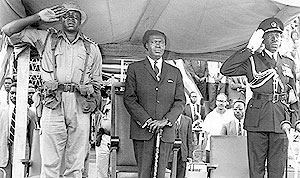On January 25, 1971, the President at the time, Dr. Apollo Milton Obote, who was on his way back home from the Common Wealth Heads of Government Meeting (CHOGM) in Singapore, was overthrown in a military coup executed by Idi Amin.
Following Obote’s overthrow, Uganda subsequently went into repeated political turmoil that led to the loss of several lives in the country.
Shortly after the overthrow, several Ugandans, including President Museveni, went into exile and later joined Tanzania with the support of former President Mwalimu Nyerere, who had offered to host them.
Col. Rtd. Tony Otoa, a former member of Kikosi Malum, once described President Museveni as strategic during the 1979 anti-Amin liberation war. President Museveni, as the Commander of the Front for National Salvation that had been formed in 1973, officially published a manifesto targeting Amin, titled “An Indictment of a Primitive Fascist”, before joining Obote’s group of Kikosi Malum in Tanzania.
Kikosi Maalum, meaning “Special Force” in Swahili, also known as the Special Battalion or the Grand Coalition, was commanded by the late Major General David Oyite Ojok on behalf of Obote.
In October 1978, Ugandan troops, including Kikosi Malum and FRONASA, invaded the Kagera Salient in northern Tanzania. With the support of Tanzanian troops, they kicked off a counter-attack to fight Amin’s regime.
In December 1978, Nyerere attached Museveni and his forces to Tanzanian troops under Brigadier Silas Mayunga, where he subsequently accompanied the Tanzanians during the counter-invasion of Uganda. He was present during the capture and destruction of Mbarara in February 1979 and involved in the Western Uganda campaign of 1979.
President Yoweri Museveni alternatively spent time on the front lines and in Tanzania, where he discussed the cooperation of various anti-Amin rebel groups as well as the political future of Uganda with Tanzanian politicians and other Ugandan opposition figures such as Obote.
Trouble for Obote stemmed from the 1964 attempt by a group led by UPC Secretary-General Ibingira to remove him from power by accusing him and Deputy Army Commander Idi Amin of involvement in a gold and ivory scandal.
Obote later blamed Israelis for plotting the coup of 1971, stemming from the 1970s, when security arrested an Israeli mercenary, Steiner, and deported him to Sudan, where he was due to testify in court.
On February 6, 1981, a group of 41 soldiers of the National Resistance Army led by Yoweri Kaguta Museveni launched yet another successful guerilla war against the dictatorship regime of Obote when the force attacked Kabamba Military Barracks following the disputed 1980 election.
The five-year liberation war became successful on January 26, 1986, when it captured state power, and since then, the day, which is popularly known as Tarehe Sita, is commemorated annually.
This year’s Tarehe Sita celebrations will be held on Tuesday, February 6, 2024, at Bugweri district headquarters under the theme of celebrating the people’s struggle for unity, security, and peace for social and economic transformation.















